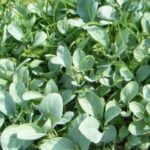Steer manure is a popular choice for enriching soil in vegetable gardens due to its nutrient-rich composition. Gardeners often wonder, “Is steer manure safe for vegetable gardens?” This article will explore the pros and cons of using steer manure, as well as provide guidance on how to use it safely.
Steer manure is essentially cow dung that has been composted and aged, making it an excellent natural fertilizer and soil conditioner. Rich in essential nutrients like nitrogen, phosphorus, and potassium, steer manure can greatly improve the health and productivity of vegetable plants. Additionally, it helps to enhance soil structure, retain moisture, and promote beneficial microbial activity.
While the benefits of using steer manure are numerous, there are also potential risks to consider. Contamination with harmful chemicals or pathogens like E. coli can pose a threat to garden produce and human health. Therefore, proper handling, storage, and application of steer manure are crucial to ensure safety in vegetable gardens. In the following sections, we will delve into the specifics of using steer manure safely and explore alternative organic fertilizers for those seeking options.
Pros of Using Steer Manure in Vegetable Gardens
One of the main benefits of using steer manure in vegetable gardens is its nutrient-rich composition. Steer manure is a natural fertilizer that contains essential nutrients such as nitrogen, phosphorus, and potassium, which are important for plant growth and development. These nutrients can help improve soil fertility, promote healthy plant growth, and increase crop yield in vegetable gardens. Additionally, steer manure is rich in organic matter, which can enhance soil structure and water retention capabilities.
In addition to being a valuable source of nutrients, steer manure also serves as an effective soil conditioner for vegetable gardens. When incorporated into the soil, steer manure helps improve soil aeration and drainage, creating a more favorable environment for plant roots to thrive.
The organic matter in steer manure can also attract beneficial earthworms and microorganisms that contribute to overall soil health. As a result, vegetable gardeners can enjoy healthier plants with stronger root systems by using steer manure as a soil amendment.
Is Beneficial for Promoting Nutrient-Rich Soil and Improving Overall Plant Health
By incorporating this natural fertilizer into garden beds or containers, gardeners can provide their vegetables with essential nutrients, improved soil structure, and enhanced water retention capabilities. However, it is important to consider some key factors when using steer manure to ensure its safe and effective application in vegetable gardens.
Cons of Using Steer Manure in Vegetable Gardens
When considering the use of steer manure in vegetable gardens, one must be aware of the potential risks associated with contamination and pathogens. While steer manure is a natural and nutrient-rich soil amendment, there are certain drawbacks that need to be taken into account before incorporating it into your gardening practices.
One concern regarding the use of steer manure is the possibility of it containing harmful contaminants such as pesticides, herbicides, or heavy metals. This can occur if the cows were fed with contaminated feed or if the manure was not properly composted before application. It is crucial to source your steer manure from reputable sources that follow proper composting protocols to minimize these risks.
Another issue to consider is the presence of pathogens in steer manure, such as E. coli and Salmonella, which can pose a health risk if transferred to fruits and vegetables consumed by humans. Proper handling and application techniques can help reduce the chances of contamination. Here are some tips on how to use steer manure safely in your vegetable garden:
- Ensure that the manure has been properly composted for an adequate period to kill off any harmful bacteria.
- Do not apply raw steer manure directly to edible crops; instead, mix it into the soil well ahead of planting.
- Wash all fruits and vegetables thoroughly before consumption to remove any potential traces of pathogens.
By following these precautions, you can minimize the risks associated with using steer manure in your vegetable garden and enjoy its benefits without compromising your health or the quality of your produce. Remember that proper handling and responsible sourcing are key factors in ensuring that steer manure is safe for vegetable gardens.
How to Use Steer Manure Safely
Steer manure can be a fantastic source of nutrients and organic matter for your vegetable garden, but it is essential to use it safely to avoid any potential risks. Proper handling, storage, and application are key to ensuring that steer manure benefits your garden without introducing harmful pathogens or contaminants.
Proper Handling
When working with steer manure, it is crucial to wear gloves to protect your skin from any potential bacteria or parasites that may be present. Additionally, make sure to wash your hands thoroughly after handling steer manure to prevent the spread of any harmful pathogens. Keep steer manure away from children and pets to minimize the risk of exposure.
Storage Tips
Store steer manure in a cool, dry place away from direct sunlight. This will help maintain the quality of the manure and prevent it from losing its nutrient content. Make sure the storage area is well-ventilated to avoid any unpleasant odors. Seal the packaging or container tightly when not in use to prevent attracting pests or rodents.
Application Methods
Before applying steer manure to your vegetable garden, allow it to decompose for at least several weeks to reduce the risk of potential pathogens. Avoid applying fresh steer manure directly onto plants or vegetables that are ready for harvest. Instead, work the aged manure into the soil before planting or use it as a topdressing around existing plants. Be mindful of overapplication, as too much steer manure can lead to nutrient imbalances in the soil.
By following these proper handling, storage, and application tips, you can safely utilize steer manure in your vegetable garden while reaping its numerous benefits without compromising safety or risking contamination.
Organic Certification of Steer Manure
Steer manure, often touted for its nutrient-rich properties and benefits for vegetable gardens, is a popular choice among gardeners looking to improve soil quality. However, one question that often arises is whether steer manure is safe for use in vegetable gardens.
The answer to this query lies not only in the quality of the product but also in its organic certification. Here are some key points to consider when it comes to ensuring the quality and safety of steer manure for your vegetable garden:
- Look for organic certification labels: When purchasing steer manure for your vegetable garden, it is essential to look for organic certification labels. These certifications ensure that the manure has been produced without synthetic chemicals or harmful additives, making it a safer option for use in your garden.
- Check for contaminants: Before using steer manure in your vegetable garden, check for any signs of contamination such as an unpleasant odor or unusual discoloration. Contaminated manure can introduce harmful pathogens into the soil, potentially affecting the health of your plants and produce.
- Consider composted steer manure: Composted steer manure is generally a safer option for vegetable gardens as the composting process helps eliminate pathogens and weed seeds. Look for steer manure that has undergone proper composting procedures to reduce the risk of introducing any unwanted elements into your garden.
Alternatives to Steer Manure for Vegetable Gardens
Steer manure is undoubtedly a popular choice for many gardeners looking to enrich their soil and promote healthy plant growth in vegetable gardens. However, some may be concerned about the safety of using steer manure due to the potential risks of contamination and pathogens. While steer manure is generally considered safe for vegetable gardens when properly handled and processed, there are alternatives available for those who prefer to explore other organic fertilizers and soil amendments.
One alternative to steer manure is compost, which is created from the decomposition of organic matter such as food scraps, yard waste, and leaves. Compost not only provides essential nutrients to plants but also helps improve soil structure, retain moisture, and suppress diseases.
Another option is fish emulsion, a liquid fertilizer made from fish byproducts that is rich in nitrogen, phosphorus, and potassium. Fish emulsion can be applied directly to the soil or used as a foliar spray to promote rapid growth in vegetables.
Additionally, aged manure from other animals such as chickens or rabbits can serve as effective substitutes for steer manure in vegetable gardens. These types of manure are typically higher in nitrogen content and can help boost plant productivity without the risks associated with fresh steer manure. Ultimately, the key factor in determining whether to use steer manure or its alternatives lies in considering your specific gardening needs, preferences, and concerns regarding safety.
| Alternative | Benefits |
|---|---|
| Compost | Provides essential nutrients; improves soil structure; retains moisture; suppresses diseases |
| Fish Emulsion | Rich in nitrogen, phosphorus, and potassium; promotes rapid growth; can be used as foliar spray |
| Aged Manure (chickens or rabbits) | Higher nitrogen content; boosts plant productivity; lower risk of contamination compared to fresh steer manure |
Case Studies
Steer manure is a popular choice for many gardeners looking to boost the nutrient content of their soil and improve the overall health of their vegetable plants. One key benefit of using steer manure in vegetable gardens is its rich nutrient content. Steer manure is high in organic matter, which helps improve soil structure, fertility, and moisture retention. This can result in healthier plants with better yields.
Moreover, steer manure also serves as an excellent soil conditioner. It can help break up heavy clay soils, improve drainage in compacted soils, and promote the growth of beneficial microorganisms in the soil. This can create a more hospitable environment for plant roots to thrive and absorb essential nutrients. Overall, the use of steer manure in vegetable gardens can lead to improved soil health and plant growth.
Though there are numerous benefits to using steer manure in vegetable gardens, it is essential to consider potential risks as well. One concern that gardeners may have is whether steer manure is safe for vegetable gardens in terms of contamination and pathogens.
While properly composted steer manure should not pose a significant risk to human health or plant safety when used correctly, there is always a small chance of harmful bacteria or pathogens present in improperly handled or stored manure. It is crucial to follow proper handling, storage, and application guidelines to minimize any potential risks associated with using steer manure in vegetable gardens.
| Benefit | Example |
|---|---|
| Nutrient-rich soil amendment | Improves soil fertility |
| Soil conditioner | Enhances soil structure |
Conclusion
In conclusion, the use of steer manure in vegetable gardens can be a beneficial practice, as it provides essential nutrients and improves soil quality. However, gardeners must be mindful of the potential risks of contamination and pathogens that may come with using steer manure. With proper handling, storage, and application techniques, these risks can be minimized, making it a safe option for organic gardening.
When considering whether steer manure is safe for vegetable gardens, it is crucial to prioritize organic certification of the product. This ensures that the steer manure has met strict standards for quality and safety, giving gardeners peace of mind when using it in their gardens. Additionally, exploring alternatives to steer manure, such as other organic fertilizers and soil amendments, can provide diversity in nutrient sources while addressing any concerns about using steer manure.
Ultimately, the decision to use steer manure in vegetable gardens should be based on individual preferences and gardening practices. By weighing the pros and cons outlined in this article and following best practices for safe usage, gardeners can enjoy the benefits of steer manure while nurturing healthy and productive vegetable gardens.
Frequently Asked Questions
Is Steer Manure Good for Tomatoes?
Steer manure can be beneficial for tomatoes as it is a good source of nutrients that promote healthy plant growth. However, it’s important to use aged or composted manure to avoid burning the roots of your tomato plants.
Can I Use Steer Manure in My Vegetable Garden?
Yes, you can use steer manure in your vegetable garden. Manure is a valuable source of organic matter and nutrients that can improve soil fertility and overall plant health. Just make sure to use aged manure to prevent any issues with burning your plants.
Which Vegetables Do Not Like Manure?
Some vegetables are sensitive to high levels of nitrogen found in manure, such as root crops like carrots and radishes. Excessive nitrogen can cause these vegetables to produce more foliage than actual edible parts. Additionally, onions and garlic prefer a low-nitrogen environment, so be cautious when adding manure near them.

If you’re looking to get into vegetable gardening, or are just looking for some tips on how to make your current garden better, then you’ve come to the right place! My name is Ethel and I have been gardening for years. In this blog, I’m going to share with you some of my best tips on how to create a successful vegetable garden.





